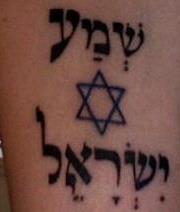The great sages and rabbis of our past used to write their commentaries on Torah pages. Scribbled around the margins could be found comments, comments on comments, and comments on comments on comments. Rabbis would hold entire discussions with their predecessors through the marginalia that could be found around a verse or two of Torah.
Now, don’t get me wrong. No rabbis have scrawled their marginalia as tattoos on my body. There isn’t a dialogue between the great sages of the past going on in my inked words. And my skin isn’t an ancient page from the Torah.
But in some ways it is. The rabbis were hoping (I believe) to have conversations that revolved around G…d, that were in some ways *with* G…d. They were seeking understanding of passages of holy scripture that could only be found in dialogue with other people. They understood the need to write down their thoughts, to write down their lack of understanding for the whole world to see.
We all carry with us scars; we all wear our pain and hope and lack of understanding written on our bodies. They are in our burn marks. They are in the scars from old injuries. They are in the wedding ring we can’t take off or the bracelet that was a gift from a lover long ago. We all carry with us our joys, in the donning of tefillin, in the binding of our chests or joyful moments when we realize we appear on the outside the way we feel on the inside. We mark our bodies in deeply meaningful manners, tattooing no less meaningful than any other of the markers.
Now imagine a world in which our bodies are as sacred as a Torah scroll. Imagine the tattoos of millions of people as conversations, dialogues between our hearts and our bodies, between our bodies and those who gaze at them. Imagine all of those tattoos as conversations that we are having with G…d, written out on the body so that thousands of others can see, comment, and involve themselves in the dialogue. Imagine that every drop of ink, every letter so carefully inscribed into the skin is a message to G…d, carrying all the hopes, fears, pain, and joy that the bearer of the tattoo feels.
What if we could make them sacred? What if we could make them holy? What if we could recognize them as the conversations with G…d that they truly have the potential to be? What if, instead of asking what a tattoo said, we asked what it meant?
I can’t speak for everyone else. I certainly do not want to speak for the wide array of tattooed people. But I do believe our bodies are sacred. I believe we can use them as tools for dialogue in so many powerful ways. There are some conversations that are so powerful, so painful, so heartfelt that we are too shy to speak them aloud to G…d. These are the conversations that become written on the body. They are no less a sacred form of communication than the rabbis who dialogued through the marginalia of Torah pages.

